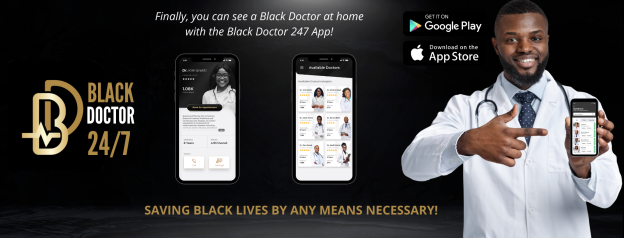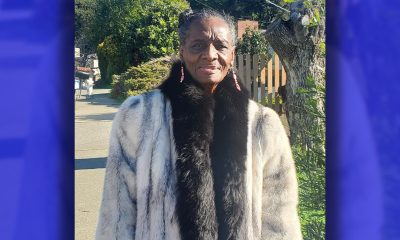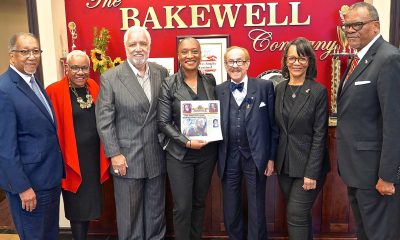Community
Barbershop 2.0: The App That’s Putting Black Health in the Palm of Our Hands
Last week, he launched a high-tech digital tool that he hopes will save lives during the COVID-19 pandemic — and beyond. He also hopes it will turn around the troubling disparities that exist when it comes to the health of Black Americans.

Dr. Bill J. Releford, a Los Angeles County-based physician and founder of the Releford Foot and Ankle Institute in Inglewood, is putting Black health care in their own hands.
Last week, he launched a high-tech digital tool that he hopes will save lives during the COVID-19 pandemic — and beyond. He also hopes it will turn around the troubling disparities that exist when it comes to the health of Black Americans.
The “Barbershop 2.0,” Releford’s new app, allows users to access Black physicians from anywhere in the world. Dr. Releford says he is building on another project he launched in 2009, the Black Barbershop Health Outreach Program. With that initiative, he worked to screen 500,000 Black men for diabetes and high blood pressure in over 100 barbershops.
Releford says during the development process, he has had to keep some of the features of his software program under wraps before it officially launched last week. In a one-on-one conversation with California Black Media contributor Charlene Muhammad, Releford talked about the benefits of the app — not just for Black men, but for their families and communities, too.
CBM: Congratulations on your creation, Dr. Releford. It appears uniquely positioned to have an immediate effect on Black men’s health. Barbershop 2.0. Tell us what’s it all about?
BR: With my first health initiative for Black men, we were going to Black-owned barber shops across the country, screening men for diabetes and high blood pressure, with nurses and volunteers. Now, we have COVID-19. It has been bittersweet. We know the bitter part very well, but some of the things that have come out of it have been beneficial. The sweet part would be the fact that it’s forced people to leverage a lot of technology that has always been there but has never been optimized. Number two, we are launching the Black Barbershop Physician Network, where you can see a Black physician, on your phone in the comfort of your home.
Health disparities have a number of driving factors. One of the most prominent driving factors, other than the racism, of course, is that studies have shown that African Americans prefer to get care from Black doctors, and studies also have confirmed that outcomes are better when patients are treated by Black physicians, particularly Black men.
Study results that were particularly granular in their data showed that white doctors tend to make less eye contact with Black patients as compared to their white patients. White doctors also touch their Black patients less than their white ones.
One thing that I have been hearing over the decades in practice, is a Black patient will come to me and say, ‘Wow! We’re so glad to see you, because they act like they didn’t want to touch me at such-and-such office.’ I hear it all the time, not knowing that there was some scientific confirmation of the things that people were just saying to me organically.
How does the app work?
You’ll be able to see a Black physician on your phone, in the comfort of your home, using telemedicine. We also have a remote vitals component, where I can check your respiration, your heart rate, and your oxygen saturation from your phone, just by downloading the app. We can check your vitals anywhere, around the world — whoever downloads this.
Is this just for Black men?
It’s not just for Black men, but the focus, our main brand has been, of course, dealing with health disparities, focusing on African American men. It’s available to anyone who wants to use the application, but a lot of our messaging is related to African American men.
When is your launch?
The app was fully operable on December 19, however, I needed to give myself a little time to get the kinks out. It launched last week on all major digital app stores.
The urgency is now. It’s a health risk just being Black in America. We do live in the most technologically advanced country in the world. However, African
Americans usually are not beneficiaries of that technology until maybe it’s antiquated or never at all. So, we know the bittersweet part, but the sweet part of this is I’m hoping we can start having some genuine conversations about our health.
How did you come up with this idea, and what was the draw for Black physicians?
Number one, they’re passionate about our people, and this is a program where money is not the driving force. Love has to be the driving force first. People first, then money, then things. I discourage people to join our network if their first question is, “well how do I get paid?” That’s not going to be for them. Although there’s money to be made, I don’t want that to be your primary objective. Before you ask for money, tell me how you can serve, first. How can you add value, first. Or add value, then ask.
So, there is a spiritual component so to speak?
It’s got to be! It’s got to be. So, this is a program that’s not for everybody. An old man told me, “Men count numbers, but God makes numbers count.” I’m passionate about this. Not just me, but for me to serve.
Activism
Oakland Post: Week of April 24 – 30, 2024
The printed Weekly Edition of the Oakland Post: Week of April 24 – 30, 2024

To enlarge your view of this issue, use the slider, magnifying glass icon or full page icon in the lower right corner of the browser window. ![]()
Alameda County
DA Pamela Price Stands by Mom Who Lost Son to Gun Violence in Oakland
Last week, The Post published a photo showing Alameda County District Attorney Pamela Price with Carol Jones, whose son, Patrick DeMarco Scott, was gunned down by an unknown assailant in 2018.

Publisher’s note: Last week, The Post published a photo showing Alameda County District Attorney Pamela Price with Carol Jones, whose son, Patrick DeMarco Scott, was gunned down by an unknown assailant in 2018. The photo was too small for readers to see where the women were and what they were doing. Here we show Price and Jones as they complete a walk in memory of Scott. For more information and to contribute, please contact Carol Jones at 510-978-5517 at morefoundation.help@gmail.com. Courtesy photo.
City Government
Vallejo Welcomes Interim City Manager Beverli Marshall
At Tuesday night’s Council meeting, the Vallejo City Council appointed Beverli Marshall as the interim city manager. Her tenure in the City Manager’s Office began today, Wednesday, April 10. Mayor Robert McConnell praised Marshall’s extensive background, noting her “wide breadth of experience in many areas that will assist the City and its citizens in understanding the complexity of the many issues that must be solved” in Vallejo.

Special to The Post
At Tuesday night’s Council meeting, the Vallejo City Council appointed Beverli Marshall as the interim city manager. Her tenure in the City Manager’s Office began today, Wednesday, April 10.
Mayor Robert McConnell praised Marshall’s extensive background, noting her “wide breadth of experience in many areas that will assist the City and its citizens in understanding the complexity of the many issues that must be solved” in Vallejo.
Current City Manager Michael Malone, whose official departure is slated for April 18, expressed his well wishes. “I wish the City of Vallejo and Interim City Manager Marshall all the best in moving forward on the progress we’ve made to improve service to residents.” Malone expressed his hope that the staff and Council will work closely with ICM Marshall to “ensure success and prosperity for the City.”
According to the Vallejo Sun, Malone stepped into the role of interim city manager in 2021 and became permanent in 2022. Previously, Malone served as the city’s water director and decided to retire from city service e at the end of his contract which is April 18.
“I hope the excellent work of City staff will continue for years to come in Vallejo,” he said. “However, recent developments have led me to this decision to announce my retirement.”
When Malone was appointed, Vallejo was awash in scandals involving the housing division and the police department. A third of the city’s jobs went unfilled during most of his tenure, making for a rocky road for getting things done, the Vallejo Sun reported.
At last night’s council meeting, McConnell explained the selection process, highlighting the council’s confidence in achieving positive outcomes through a collaborative effort, and said this afternoon, “The Council is confident that by working closely together, positive results will be obtained.”
While the search for a permanent city manager is ongoing, an announcement is expected in the coming months.
On behalf of the City Council, Mayor McConnell extended gratitude to the staff, citizen groups, and recruitment firm.
“The Council wishes to thank the staff, the citizens’ group, and the recruitment firm for their diligent work and careful consideration for the selection of what is possibly the most important decision a Council can make on behalf of the betterment of our City,” McConnell said.
The Vallejo Sun contributed to this report.
-

 Activism4 weeks ago
Activism4 weeks agoOakland Post: Week of March 27 – April 2, 2024
-

 #NNPA BlackPress4 weeks ago
#NNPA BlackPress4 weeks agoBeloved Actor and Activist Louis Cameron Gossett Jr. Dies at 87
-

 Community2 weeks ago
Community2 weeks agoFinancial Assistance Bill for Descendants of Enslaved Persons to Help Them Purchase, Own, or Maintain a Home
-

 Activism3 weeks ago
Activism3 weeks agoOakland Post: Week of April 3 – 6, 2024
-

 Business2 weeks ago
Business2 weeks agoV.P. Kamala Harris: Americans With Criminal Records Will Soon Be Eligible for SBA Loans
-

 Activism2 weeks ago
Activism2 weeks agoOakland Post: Week of April 10 – 16, 2024
-

 Community2 weeks ago
Community2 weeks agoAG Bonta Says Oakland School Leaders Should Comply with State Laws to Avoid ‘Disparate Harm’ When Closing or Merging Schools
-

 Community1 week ago
Community1 week agoOakland WNBA Player to be Inducted Into Hall of Fame






















































